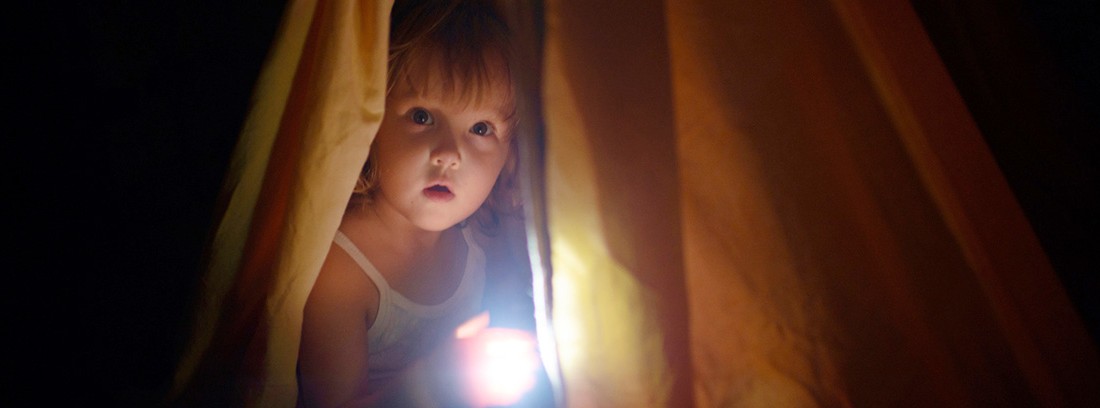Childhood phobias and fears

The fears or phobias infantile are very frequent, coming to appear between the 30 and 50% of children, but their natural evolution is that they disappear as the child grows and approaches adolescence.
What are childhood phobias?
Children present, within their development, that they are normal and typical of their age. These are very basic and normal reactions that have survival and adaptive value, that are burned in our most ancient nervous system and that have allowed us to survive as a species. The evolutionary fears are positive in the sense that they force the child to face certain stressful situations and develop skills to face and overcome them.
At each stage of development we can find examples of different evolutionary fears that appear with more or less intensity depending on the child:
- Less than a year: strange people or very intense stimuli (noise, for example).
- 2-4 years: animals and separation from parents.
- 4-6 years: monsters, ghosts or the dark.
- 6-9 years: fear of ridicule.
- 9-12 years: accidents, illnesses or poor performance in school.
- 12-18 years: personal relationships and the image they project of oneself.
The most frequent childhood phobias
Childhood phobias are classified into five types:
Fear of the unknown (fantastic beings and the dark)
It usually appears in one in three children around two years and decreases around eight or nine. Fear of the dark mixes with others fears such as monsters or imaginary beings. In these cases the help is the accompaniment, give safety to the child until you are able to fall asleep in a pleasant and calm environment. Routines can help us.
Fear of failure and criticism
It could be related to fear of school, specific situations (such as public speaking) or subjects. This type of fear, unlike the others that diminish over the years, increase with age. The best way to help is with the collaboration of the family and the teachers, avoiding, as far as possible, truancy.
Fear of danger, physical harm, and death
It is a fear of protection and survival, but in an irrational way it greatly limits social life and normal activities for the age of the child.
Fear of animals
It is one of the phobias in which a negative experience or the fear of the parents can have a great weight.
Fear of the doctor
It includes fear of medical procedures and their entire context: gown, injections, depressants ... It may be caused by a bad previous experience, therefore, good experiences are the ideal prevention, as well as a positive relationship of parents with medical professionals .
Causes of childhood phobias
Its origin may be caused by a negative conditioning, from a previous bad experience or by the genetic predisposition of the child to present it. It must be taken into account that we are biologically designed to trigger rejection behaviors in the face of certain stimuli that, in ancient times, served us to survive.
Treatment in childhood
First, you need one by one child psychologist to assess whether what a child presents is a evolutionary fear or a phobia. It is very important to evaluate fears when parents have doubts about their seriousness, since, if an adequate intervention is not carried out, they will grow older and condition social and family life. The two therapeutic tools that can be used are:
- Systematic live desensitization: a plan is established to offer the child, progressively, an approach to the phobic object.
- Systematic desensitization in imagination: it is the same procedure as the previous one but the situations are imagined.
Can they be prevented?
While we have said that biology and experience can trigger a phobia in children, parents can prevent fears irrational or empower children in coping skills:
- Educate the child in autonomy, without overprotection. This is one of the strategies most defended by child psychologists.
- Offer the child an environment of trust where you can express yourself freely, without coercion and where you can talk about your fears. In this way, we can address them from very early stages and clarify all their doubts so that they do not grow older.
You have doubts?Sign up for Savia, MAPFRE's digital health services platform that allows you to speak for free by chat or video consultation immediately with a doctor.
In addition, you can buy a specialized session for early ages to consult and solve the problems that concern you most in your children.
SIGN UP FREE
- Its origin may be caused by a negative conditioning, from a previous bad experience or by the genetic predisposition of the child to present it.
- Parents can prevent irrational fears or empower children in coping skills. To treat them, a good diagnosis is first necessary by a child psychologist to assess whether what a child presents is a evolutionary fear or a phobia.
Dra. Esther Martínez Pediatric Specialist
(Updated at Apr 13 / 2024)